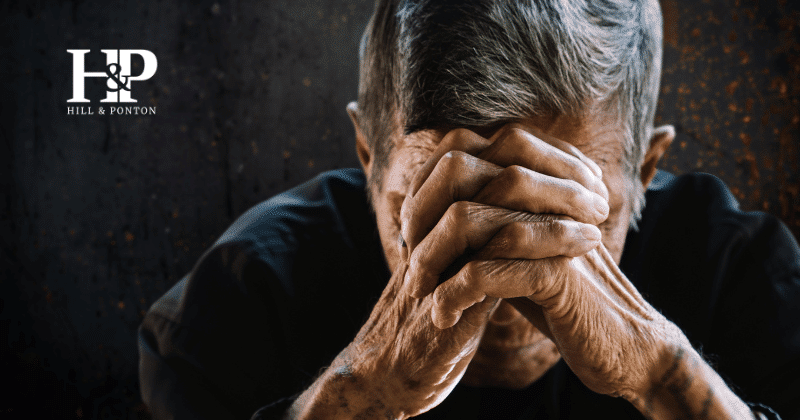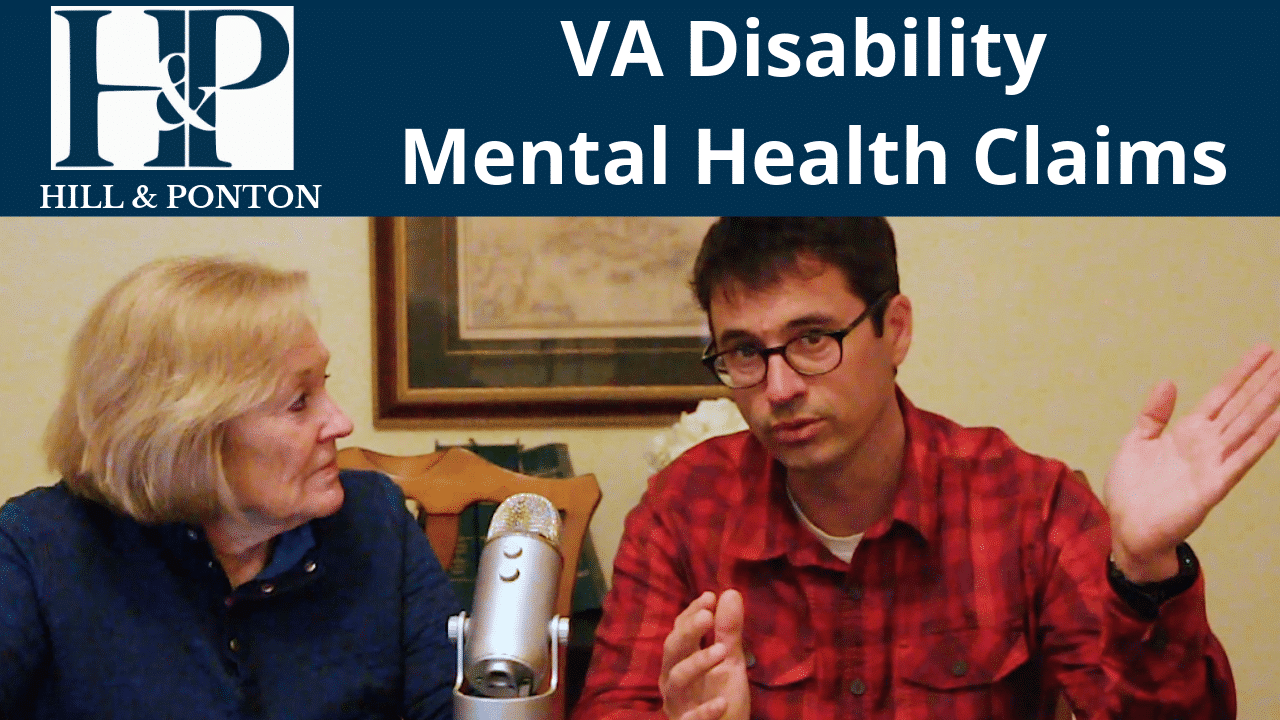According to VA, it’s estimated about 1 in 3 (33.3%) of Veterans have some symptoms of depression; 1 in 5 (20%) have serious symptoms and 1 in 8 (12.5%) have major depression, requiring treatment with psychotherapy and antidepressants.
If you are a veteran who believes they may be struggling with depression or has been diagnosed with depression, we know that it can be a tough battle and one that is often hard to explain.
Understanding how VA rates depression is often a necessity when obtaining disability benefits. If you’re struggling to make sense of these ratings or feeling lost on what you should be rated based on your symptoms, we’re here to help.
What are the VA ratings for depression in veterans?
VA relies on the Diagnostic and Statistical Manual for Mental Disorders (DSM-5) to rate all mental health conditions. As long as a veteran’s symptoms meet the frequency, duration and severity outlined in the DSM-5, they should receive a diagnosis of depression. Once this diagnosis is reached, VA will apply the General Rating Formula for Mental Health Conditions found under 38 CFR § 4.130.
The possible disability ratings for depression are: 0, 10, 30, 50, 70 and 100 percent (detailed below).
All mental health disability ratings are based on the severity of the condition and the resulting level of social and occupational impairment. Watch below our video guide on ratings or scroll down for a written explanation of all the ratings!
0% VA Rating for Depression
This is typically a very mild presentation. If VA awards a 0 percent rating, they have determined you have a diagnosis, but the symptoms do not result in a functional impairment or require medication. This rating is also non-compensable, meaning you will not receive monthly payments for this condition.
- Mild, transient periods of depression
- Minimal impact on work performance
- Symptoms largely controlled by medication
- No significant impairment on social relationships
10% VA Rating for Depression
This rating also represents a less severe form of depression. You may experience mild periods of depression resulting in social or occupational impairments, but no major functional impairments, and can be managed with medication.
- Mild sleep disturbances, such as difficulty falling asleep
- Occasional mild anxiety
- Slight impairment with social and occupational functioning
- Periods of depression that are infrequent and manageable
30% VA Rating for Depression
This rating is also meant to represent mild symptoms, but more pronounced than the 10 percent rating. “Occasional decrease in work efficiency and intermittent periods of inability to perform occupational tasks” may occur–meaning you might miss work on occasion, or be less involved in social activities.
- Frequent overeating or loss of appetite
- Disturbed motivation and mood affecting work
- Difficulty in establishing and maintaining effective work and social relationships
- Symptoms such as chronic sleep impairment, memory loss and fluctuating moods
50% VA Rating for Depression
This rating is a significant increase in the frequency, duration and severity of symptoms. Receiving this rating likely means you display more cognitive impairments. Some mood-associated symptoms may begin to manifest. Social and occupational impairments may also be significantly worse, and have a greater day-to-day impact.
- Reduced reliability and productivity due to depression
- Regular and more prolonged periods of depression
- Difficulty adapting to stressful situations, including the work environment
- Symptoms like panic attacks more than once a week, impaired judgement and mood disturbances
70% VA Rating for Depression
This rating represents a wide array of symptoms, including progression of previously noted symptoms. You may suffer from all the symptoms of previous ratings, but at higher frequency, duration and severity. The depression is likely constant, and causing regular issues with your day-to-day life.
- Suicidal ideation
- Obsessive behaviors with routine activities
- Impaired impulse control and neglect of appearance and hygiene
- Difficulty adapting to change, inability to establish and maintain relationships
100% VA Rating for Depression
This is difficult to obtain because the symptoms need to be so severe that they totally impair your life, to the point you are unable to function. There is a substantial decline in cognitive and emotional function. Self-injury and suicide attempts/ideology are consistent with a 100 percent rating. A 100 percent rating for depression can also include homicidal ideations.
- Inability to perform most kinds of work
- Persistent delusions or hallucinations
- Persistent danger of hurting oneself or others
- Grossly inappropriate behavior or total social isolation due to symptoms
You can still potentially work with a 100% VA disability rating for depression, but it is substantially more difficult to do so.
How do I get service connection for depression?
There are three basic elements to service connection:
- A current diagnosis of the condition
- Evidence of an in-service event, injury or illness
- A medical nexus linking the current, diagnosed condition to the in-service occurrence
It is important to note that for depression diagnosis’, it is not necessary to establish a stressor (i.e., a traumatic event). This is only required when establishing service connection for post-traumatic stress disorder (PTSD).
Can I get Separate Ratings for Mental Health Conditions like PTSD or Anxiety and Depression?
You can, but it is very unlikely.
Usually depression, as mentioned above, is an underlying symptom of PTSD or another mental health condition.
The only circumstance in which a veteran will be rated for more than one mental health disorder is if the symptoms and the level of impairment both with work and socially can be clearly differentiated among the different diagnosis’.
If, for example, you were already rated for PTSD, but you also got a diagnosis for depression, your symptoms would be considered the same as your PTSD symptoms and you wouldn’t be rated separately. Generally you cannot be rated for more than one mental health disability, per the Pyramiding rules.
Can I get 100% Individual Unemployability (TDIU) Benefits for Depression?
Yes! In cases where a veteran’s depression is so severe they are unable to secure and maintain substantially gainful employment, they can apply for total disability based on individual unemployability (TDIU) benefits.
TDIU provides monthly compensation at the 100 percent level, even if a veteran’s combined disability rating is less than 100 percent. Want to learn more about TDIU for depression? Read our IU Guide by clicking here!
Can I receive Special Monthly Compensation (SMC) for depression?
Yes, you can receive SMC-S for depression, if you have at least one condition rated 100 percent and at least one of the following:
- Permanently housebound because of service-connected conditions
- Another condition rated 60% or a group of conditions rated 60% that are unrelated to the 100% condition
What are C&P Exams for depression like?
When determining a rating for a mental illness, VA will normally send veterans to a Compensation and Pension Exam, for a doctor to review all the veteran’s symptoms and give a medical opinion. Since there is variability in this process, it can be extremely difficult to predict the exact rating a veteran will receive.
Find out how to prepare for a C&P exam for depression from a VA medical examiner! And check out our comprehensive guide about C&P exams.
Why is it so hard to get a VA rating for depression?
It can be difficult to get a VA rating for disability benefits for mental health conditions like depression and anxiety because the medical evidence used to support the diagnosis is based on subjective criteria. Objective tests that a doctor might use to discover other conditions, like blood tests, scans, etc. can’t tell your doctor what you are thinking or feeling in your day-to-day life.
How is depression diagnosed? What are symptoms of depression in Veterans?
Depression is defined as a “mood disorder that causes persistent feelings of sadness and loss of interest in day-to-day activities.” Most often diagnosed as Major Depressive Disorder (MDD), depression affects how you think, feel and behave, and can lead to a wide range of problems. Pre-screening for Major Depressive Disorder typically begins with the completion of the Patient Health Questionnaire (PHQ-9).
The signs and symptoms of Major Depressive Disorder in veterans can include:
- Suicidal thoughts, attempts or suicide
- Angry outbursts, irritability or frustration
- Loss of interest in activities
- Sleep disturbances, whether it is sleeping too much or too little
- Tiredness and lack of energy
- Reduced appetite or increased cravings for food
- Anxiety, agitation and restlessness
- Slowed thinking, speaking or body movements
- Trouble concentrating
- Suicidal thoughts, attempts or suicide
What is the average VA rating for depression?
Typically, a 30% VA disability rating for depression is the most common one, or a higher rating. A 30% rating is appropriate if the depression symptoms are worse but still manageable.
Can depression be permanent and total?
If your depression is anticipated not to improve, you could qualify for the status of Permanent and Total Disability (P&T).
Can VA reduce my disability rating for depression?
Yes, VA can lower a veterans disability rating for depression. If this happens to you, you can obtain new evidence and challenge VA’s decision with an appeal. Our VA lawyers specialize in appeals.
Get a Free Case Evaluation
In service of our nation, you gave everything you had. You sacrificed your comfort, your peace, and sometimes even your well-being. If the VA denied your rightful benefits, contact us today.
Get Started



